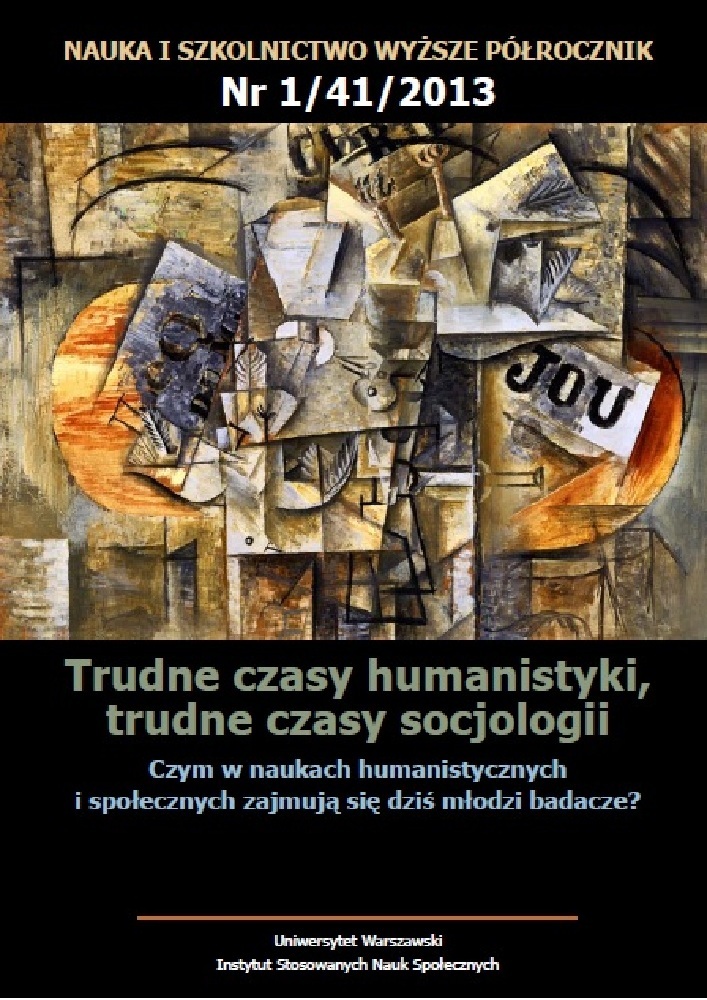Abstract
The claim of the paper is that postulates of law making, as well as of analyzing law on the basis of thescientific knowledge on the behavioral regularities lead to paradoxical consequences. I present basic assumptions of the behavioral approach to analysis of law and the reasoning which results in the paradox. In the contemporary research on law, one may observe an increasing interest, especially in the United States and Western Europe, in the development and outcomes of behavioral sciences. References to these sciences are justified from the theoretical perspective (behavioral theories and methods should enable better understanding of the behavioral impact of law), as well as from the policy perspective (they should make possible more effective influences on people’s behavior). In the paper I analyze whether current findings of behavioral sciences allow for formulating such far-reaching conclusions concerning the content of legal norms and their behavioral impact. It will be demonstrated how paradoxes could be avoided, when taking into account concepts and analyses of Leon Petrażycki, especially methodological aspects of his work.
Funding
Polish National Science Centre grant DEC-2012/07/N/HS1/01560
References
Arlen J., Talley E. 2008, Experimental law and economics, Cheltenham: Edward Elgar Publishing
Calabresi G. 1975, Concerning cause and the law of torts. An essay for Harry Kalven, ”The University of Chicago Law Review” (43)
Cartwright N. 2007, Hunting causes and using them, Cambridge University Press
Cooter R., Ulen T. 2009, Ekonomiczna analiza prawa, Warszawa: Wydawnictwo C.H. Beck
Eells E. 1991, Probabilistic causality, Cambridge University Press
Ellickson R. 1994, Order without law: how neighbors settle disputes, Cambridge, Mass: Harvard University Press
Faralli C. 2005, The legacy of American legal realism, ”Scandinavian Studies in Law” 48
Fittipaldi E. 2012, Everyday legal ontology. A psychological and linguistic investigation within the frame of Leon Petrazycki’s theory of law, Milan: LED Edizioni Univeritarie
Galbiati R., Vertova P. 2008, Obligations and cooperative behavior in public good games, ”Games and Economic Behavior”, Elsevier 64(1)
Gneezy U., Rustichini A. 2000, A fine is a price, ”The Journal of Legal Studies” 29(1)
Guthrie Ch., 2003, Prospect theory, risk preference, and the law, ”Northwestern University Law Review” 97
Hausman D. 1992, Essays on philosophy and economic methodology, Cambridge University Press
Hume D. 2005, Traktat o naturze ludzkiej, Warszawa: Fundacja Aletheia Jolls Ch., Sunstein C., Thaler R. 1998, A behavioral approach to law and economics, “Stanford Law Review” 5(50)
Kahneman D., Tversky A. 1979, Prospect theory: an analysis of decision under risk, ”Econometrica” 47
Kant I. 2001, Krytyka czystego rozumu, Kęty: Wydawnictwo Antyk
Korobkin R., Ulen T. 2000, Law and behavioral science: removing rationality assumption from law and economics, ”California Law Review” (88), str. 1051-1144
Kotarbiński T., 1969, Petrażyckiego koncepcja twierdzenia adekwatnego na tle dawniejszych doktryn pokrewnych, [w:] Z zagadnień teorii prawa i teorii nauki Leona Petrażyckiego, K. Opałek (red.), Warszawa: PWN
Kurczewski J. 1975, Pojęcia i teorie, [w:] Prawo w społeczeństwie, J. Kurczewski (red.), Warszawa: PWN
Kurczewski J. 1977, O badaniu prawa w naukach społecznych, Warszawa: Wydawnictwa Uniwersytetu Warszawskiego
Lande J. 1959, Studia z filozofii prawa, Warszawa: PWN
Landes W.M, Posner R. 1983, Causation in tort law: an economic approach, ”Journal of Legal Studies” 12
Leśniewski S. 1911, Przyczynek do analizy zdań egzystencjalnych, ”Przegląd Filozoficzny” 3(14)
Małecka M. 2012, Czy zastosowanie teorii decyzji do analiz prawa prowadzi do paradoksu?, „Przegląd Filozoficzny Nowa Seria” 2(82)
Neumann von. J, Morgenstern O. 1947, Theory of games and economic behavior, Princeton University Press
Pearl J. 2000, Causality: models, reasoning, and inference, Cambridge University Press
Peterson M. 2009, An introduction to decision theory, Cambridge University Press
Petrażycki L. 1959a, Wstęp do nauki prawa i moralności. Podstawy psychologii emocjonalnej, Warszawa: PWN
Petrażycki L. 1959b, Teoria prawa i państwa t.1, Warszawa: PWN
Petrażycki L. 1959c, Teoria prawa i państwa t.2, Warszawa: PWN
Petrażycki L. 1985, O nauce, prawie i moralności. Pisma wybrane, Warszawa: PWN
Piniewski B., Codagnone, C., Osimo, D. 2011, Nudging lifestyles for better health outcomes: crowdsourced data and persuasive technologies for behavioral change, ”JRC Scientific and Technical Reports”, European Commission
Polinsky A.M., Shavell S. 2007, Handbook of Law and Economics, Amsterdam-Boston: Elsevier North-Holland Publishing Company
Salzberger E. 2007, The economic analysis of law – the dominant methodology for legal research?!, ”University of Haifa Faculty of Law Legal Studies Research Paper” no. 1044382
Shavell S. 1980, An analysis of causation and the scope of liability in the law of torts, ”The Journal of Legal Studies” (9)
Spirtes P., Glymour C., and Scheines R. 1993, Causation, Prediction and Search, New York/Heidelberg: Springer-Verlag
Sunstein C. 2000, Introduction, [w:] Behavioral law & economics, Sunstein C. (red.), Cambridge University Press.
Suppes P. 1970, A probabilistic theory of causality, Amsterdam-Boston: Elsevier North-Holland Publishing Company
Tversky A., Kahneman D. 1974, Judgment under uncertainty: heuristics and biases, ”Science” (185)
Woleński J. 1969, Metodologiczne dążenia Petrażyckiego a współczesna teoria nauki, [w:] Z zagadnień teorii prawa i teorii nauki Leona Petrażyckiego, K. Opałek (red.), Warszawa: PWN
Wróblewski J. 1960, Metodologia etyki Leona Petrażyckiego, „Studia Filozoficzne” 2-3
